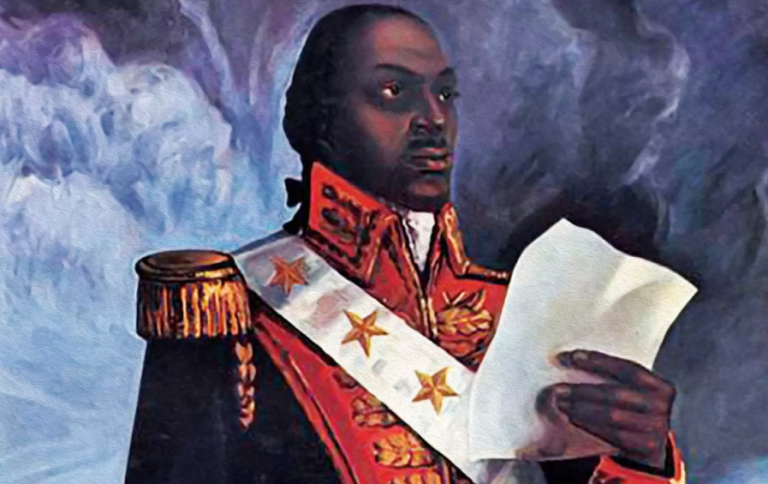West African
François Toussaint L’Ouverture was born François Toussaint on May 20, 1743. Although his early life is not well documented, it is believed that he descended from West African Royalty. His father was Gaou Guinou, the youngest son of the king of Allada, a West African kingdom. He and his family were captured and sold into slavery.
Slavery
Toussaint and his family were sent to the Caribbean. His master taught him how to read and write. He enjoyed reading the classics and the Enlightenment political philosophers. Additionally, he studied Catholicism devoutly. After impressing his master, he was recognized as the plantation’s chief steward. He was granted his freedom in 1776 but continued working for his former master.
Slave Revolt
By 1791, slaves in the French colony of Saint-Domingue rebelled. They were inspired to do so by the French Revolution. Toussaint remained neutral during the revolt for as long as he could. Despite having a family and being 50 years old, his religious beliefs prompted him to join the rebellion.
L’Ouverture
Toussaint sent his family to the Spanish-ruled eastern half of Haiti and then sent his former master’s family to the U.S. He then joined the revolt. Having learned African and Creole herbal healing techniques, he served as a doctor for the soldiers, as well as a soldier himself. He was soon placed in command of 600 former slaves. His troop quickly grew to over 4,000 men. He led his men to victory in many battles. He also adopted the name, L’Ouverture, or ‘opening the way.’

Haitian Revolution
The French eventually granted the slaves freedom and citizenship. From there, L’Ouverture ordered his men to fight alongside the French against the Spanish. He led an attack on Santa Domingo which was under Spanish control. In July of 1795, the Treaty of Basel was signed and the war between France and Spain had ended. By the following year, he became the leading political and military figure in the colonies.
Mulatto Army
Once L’Ouverture freed the slaves, a domestic threat to their freedom arose. The Mulatto population who were free prior to the revolt had owned slaves themselves and wanted their former slaves returned to them. After L’Ouverture denied their request, a mulatto army formed. L’Ouverture and his men defeated the mulatto army.
Napoleon
Once Napoleon Bonaparte gained control of France, he issued a new constitution. The French colonies would be ruled under special laws. In order to avoid the reinstating of slavery, L’Ouverture professed himself a devout Frenchman. Napoleon acknowledged his position as the colonial governor so long as L’Ouverture did not invade Santo Domingo.
Death
The temptation of ruling Hispaniola drove L’Ouverture to invade Santo Domingo. He defeated the French troops with ease. However, Napoleon sent his troops to invade the island. Many of L’Ouverture’s men turned on him. He was arrested and taken to Fort-de-Joux for interrogation. François Toussaint L’Ouverture died of pneumonia and starvation on April 7, 1803. He was 59 years old.

**The views and actions of the DDH historical figures that are featured may not reflect the views and beliefs of Ramiro The Writer or We Buy Black. Thank you.**
]]>








